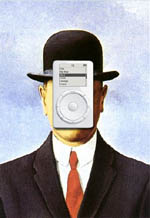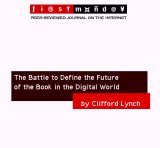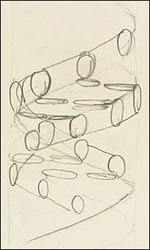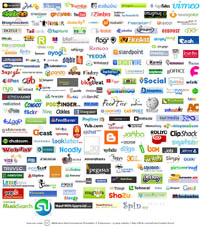News broke quietly a little over a week ago that Google will begin selling full digital book editions from participating publishers. This will not, Google makes clear, extend to books from its Library Project — still a bone of contention between Google and the industry groups that have brought suit against it for scanning in-copyright works (75% of which — it boggles the mind — are out of print).
 Let’s be clear: when they say book, they mean it in a pretty impoverished sense. Google’s ebooks will not be full digital editions, at least not in the way we would want: with attention paid to design and the reading experience in general. All you’ll get is the right to access the full scanned edition online.
Let’s be clear: when they say book, they mean it in a pretty impoverished sense. Google’s ebooks will not be full digital editions, at least not in the way we would want: with attention paid to design and the reading experience in general. All you’ll get is the right to access the full scanned edition online.
Much like Amazon’s projected Upgrade program, you’re not so much buying a book as a searchable digital companion to the print version. The book will not be downloadable, printable or shareable in any way, save for inviting a friend to sit beside you and read it on your screen. Fine, so it will be useful to have fully searchable texts, but what value is there other than this? And what might this suggest about the future of publishing as envisioned by companies like Google and Amazon, not to mention the future of our right to read?
About a month ago, Cory Doctorow wrote a long essay on Boing Boing exhorting publishers to wake up to the golden opportunities of Book Search. Not only should they not be contesting Google’s fair use claim, he argued, but they should be sending fruit baskets to express their gratitude. Allowing books to dwell in greater numbers on the internet saves them from falling off the digital train of progress and from losing relevance in people’s lives. Doctorow isn’t talking about a bookstore (he wrote this before the ebook announcement), or a full-fledged digital library, but simply a searchable index — something that will make books at least partially functional within the social sphere of the net.
This idea of the social life of books is crucial. To Doctorow it’s quite plain that books — as entertainment, as a diversion, as a place to stick your head for a while — are losing ground in a major way not only to electronic media like movies, TV and video games (that’s been happening for a while), but to new social rituals developing on the net and on portable networked devices.
Though print will always offer inimitable pleasures, the social life of media is moving to the network. That’s why we here at if:book care so much about issues, tangential as they may seem to the future of the book, like network neutrality, copyright and privacy. These issues are of great concern because they make up the environment for the future of reading and writing. We believe that a free, neutral network, a progressive intellectual property system, and robust safeguards for privacy are essential conditions for an enlightened digital age.
We also believe in understanding the essence of the new medium we are in the process of inventing, and about understanding the essential nature of books. The networked book is not a block on a shelf — it is a piece of social software. A web of revisions, interactions, annotations and references. “A piece of intellectual territory.” It can’t be measured in copies. Yet publishers want electronic books to behave like physical objects because physical objects can be controlled. Sales can be recorded, money counted. That’s why the electronic book market hasn’t materialized. Partly because people aren’t quite ready to begin reading books on screens, but also because publishers have been so half-hearted about publishing electronically.
They can’t even begin to imagine how books might be enhanced and expanded in a digital environment, so terrified are they of their entire industry being flushed down the internet drain — with hackers and pirates cannibalizing the literary system. To them, electronic publishing is grit your teeth and wait for the pain. A book is a PDF, some DRM and a prayer. Which is why they’ve reacted so heavy-handedly to Google’s book project. If they lose even a sliver of control, so they are convinced, all hell could break loose.
But wait! Google and Amazon are here to save the day. They understand the internet (naturally — they helped invent it). They understand the social dimension of online spaces. They know how to harness network effects and how to read the embedded desires of readers in the terms and titles for which they search. So they understand the social life of books on the network, right? And surely they will come up with a vision for electronic publishing that is both profitable for the creators and every bit as rich as the print culture that preceded it. Surely the future of the book lies with them?
 Sadly, judging by their initial moves into electronic books, we should hope it does not. Understanding the social aspect of the internet also enables you to cunningly restrict it, more cunningly than any print publishers could figure out how to do.
Sadly, judging by their initial moves into electronic books, we should hope it does not. Understanding the social aspect of the internet also enables you to cunningly restrict it, more cunningly than any print publishers could figure out how to do.
Yes, they’ll give you the option of buying a book that lives its life on line, but like a chicken in a poultry plant, packed in a dark crate stuffed with feed tubes, it’s not much of a life. Or better, let’s evaluate it in the terms of a social space — say, a seminar room or book discussion group. In a Google/Amazon ebook you will not be allowed to:
– discuss
– quote
– share
– make notes
– make reference
– build upon
This is the book as antisocial software. Reading is done in solitary confinement, closely monitored by the network overseers. Google and Amazon’s ebooks are essentially, as David Rothman puts it on Teleread, “in a glass case in a museum.” Get too close to the art and motion sensors trigger the alarm.
So ultimately we can’t rely on the big technology companies to make the right decisions for our future. Google’s “fair use” claim for building its books database may be bold and progressive, but its idea of ebooks clearly is not. Even looking solely at the searchable database component of the project, let’s not forget that Google’s ranking system (as Siva Vaidhyanathan has repeatedly reminded us) is non-transparent. In other words, when we do a search on Google Books, we don’t know why the results come up in the order that they do. It’s non-transparent librarianship. Information mystery rather than information science. What secret algorithmic processes are reordering our knowledge and, over time, reordering our minds? And are they immune to commercial interests? And shouldn’t this be of concern to the libraries who have so blithely outsourced the task of digitization? I repeat: Google will make the right choices only when it is in its interest to do so. Its recent actions in China should leave no doubt.
Perhaps someday soon they’ll ease up a bit and let you download a copy, but that would only be because the hardware we are using at that point will be fitted with a “trusted computing” module, which which will monitor what media you use on your machine and how you use it. At that point, copyright will quite literally be the system. Enforcement will be unnecessary since every potential transgression will be preempted through hardwired code. Surveillance will be complete. Control total. Your rights surrendered simply by logging on.
 A smart column in Wired by Leander Kahney explains why France’s new legislation prying open the proprietary file format lock on iPods and other entertainment devices is an important stand taken for the public good:
A smart column in Wired by Leander Kahney explains why France’s new legislation prying open the proprietary file format lock on iPods and other entertainment devices is an important stand taken for the public good:








